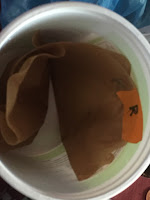 |
| I am working on a project for the 2017 growing season to work my way through 100 garden hacks*. |
Each year new seeds come in, but not all get planted. Many retain a high rate of viability for more than one year and it can be great to reduce waste and essentially double your return of investment (ROI) on seed purchasing, as well as the investment of energy and time involved with seed collecting.
Though you can just plant them all, it sometimes is not possible to use up materials (especially space) or have to purchase more seed germination specific materials just to to check if old seeds are still able to produce.
- no potting mix needed
- no flats of mismatched pots
- simple way of reducing moisture loss with the lid
This method also minimized mess mess as well, which makes it easily mobile and easy cleanup - all handy features for working with kids, i.e. you could take indoors and not worry about floors and furniture.
Moistened coffee filter
Plastic container
Clear lid that covers the dish - it does not need to fit perfectly
 |
| moisten the filter |
 | ||||
| put the moistened filter in the container, multiple filters can be used
|
 |
| spread the seeds out on the filter and cover with the lid |
Do not place the container in direct sunlight as you wait for the germination and check on it daily:
- ensure the paper stays moist - just moist, not standing in water or dripping, or so wet that the paper tears, etc.
- and look for germination.
If you want to open the filters to look directly at the seeds changes in the seed: cracks in the seed coat, and emerging white/green tissue should appear as the root (radicle) forms.

Knowing when to call a seed unviable can be like microwaving popcorn. If any seeds in the batch germinate, if any have still not responded by the time your germinated seed/s are ready to be planted than you'll know those duds can be composted. However, seeds vary in their germination times; some seeds take longer than others to trigger the seed to open and the plant embryo to develop. Older seeds can also take longer than younger, larger or thicker seeds take longer, etc.
So if you have a batch where you see no germination in the entire bunch, you may want to give them a few weeks just to be sure. There are some extreme germination times out there, but generally speaking after 4 weeks with no response from the seed ,you can go ahead and compost the entire unviable batch.
*101+ Garden Hacks magazine. 2017. Rodale, Inc.
 |
| I found this copy on a CVS magazine stand :) However, portions of this publication previously appeared at RodaleOrganicLife.com |

